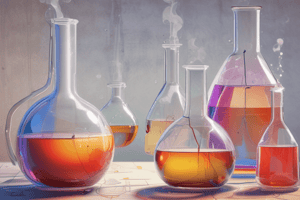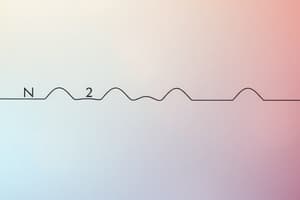Podcast
Questions and Answers
What is the most convenient way to express the rate of a reaction?
What is the most convenient way to express the rate of a reaction?
- Change in concentration with time (correct)
- Change in volume with time
- Change in pressure with time
- Change in temperature with time
For a reaction where A molecules are converted to B molecules, what does ∆[A] represent?
For a reaction where A molecules are converted to B molecules, what does ∆[A] represent?
- Increase in A molecules over time
- Average concentration of A molecules
- Total number of A molecules
- Decrease in A molecules over time (correct)
Why is a minus sign needed in the rate expression for the reactant A?
Why is a minus sign needed in the rate expression for the reactant A?
- To confuse the readers
- To stop the reaction
- To make the rate positive (correct)
- To slow down the reaction
When monitoring a reaction, why don't we need a minus sign for the product B?
When monitoring a reaction, why don't we need a minus sign for the product B?
What does ∆t represent in the rate expression?
What does ∆t represent in the rate expression?
In the context of a reaction, what does 'Rate' refer to specifically?
In the context of a reaction, what does 'Rate' refer to specifically?
What term is used to describe the area of chemistry concerned with reaction rates?
What term is used to describe the area of chemistry concerned with reaction rates?
Which of the following best defines chemical kinetics?
Which of the following best defines chemical kinetics?
What does the rate of a chemical reaction measure?
What does the rate of a chemical reaction measure?
Which factor determines how fast the concentration of a reactant or product changes with time?
Which factor determines how fast the concentration of a reactant or product changes with time?
What is the role of chemical kinetics in understanding reactions?
What is the role of chemical kinetics in understanding reactions?
Why is it important for reactions to occur at a reasonable rate?
Why is it important for reactions to occur at a reasonable rate?
Flashcards are hidden until you start studying
Study Notes
Chemical Reaction Rates
- Chemical reactions proceed at different rates or speeds, varying from very slow to extremely rapid.
- Examples of reaction rates: rusting of iron (quick), ripening of fruits (days), weathering of stone (over a decade), breakdown of plastics in the environment (over a hundred years), and combustion of gasoline or explosion of gunpowder (seconds).
Chemical Kinetics
- Chemical kinetics is the area of chemistry concerned with reaction rates.
- The term "kinetic" suggests movement or change.
- Chemical kinetics refers to the rate of reaction, which is the change in concentration of a reactant or a product over time.
Measuring Reaction Rates
- The rate of a chemical reaction measures the change in concentration of a reactant or a product per unit time.
- Reaction rates can be expressed by monitoring the decrease in concentration of reactants or the increase in concentration of products.
- The rate of a reaction determines how fast the concentration of a reactant or product changes with time.
Rate Expression
- The rate of a reaction can be expressed as: Rate = -∆[A] / ∆t or Rate = ∆[B] / ∆t
- ∆ denotes the difference between the final and initial state.
- ∆[A] and ∆[B] are the changes in concentration (mol L−1) over a period ∆t.
- A minus sign is needed in the rate expression to make the rate positive when the concentration of A decreases.
Studying That Suits You
Use AI to generate personalized quizzes and flashcards to suit your learning preferences.




